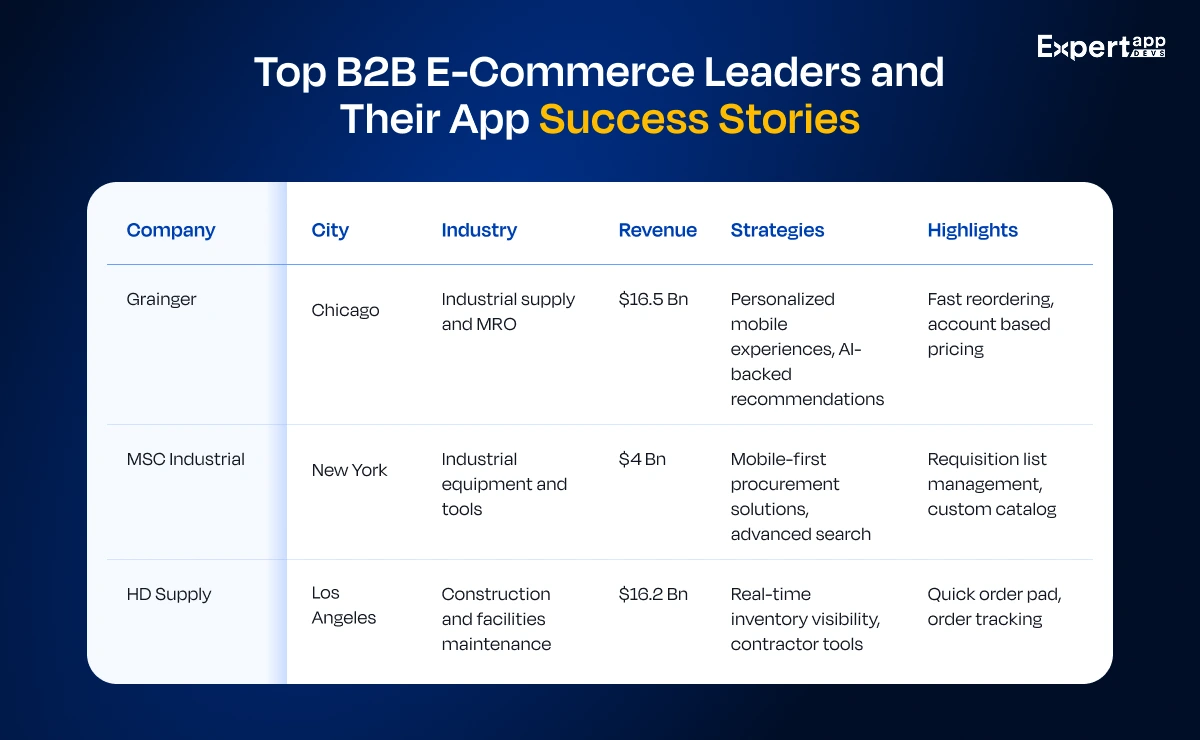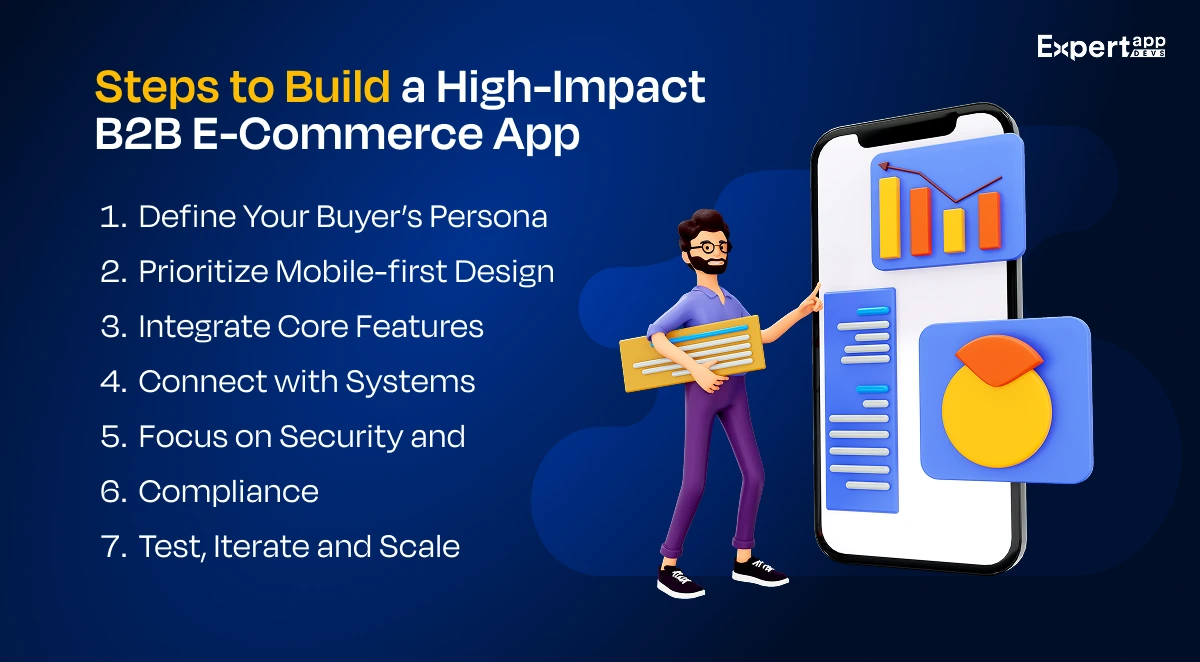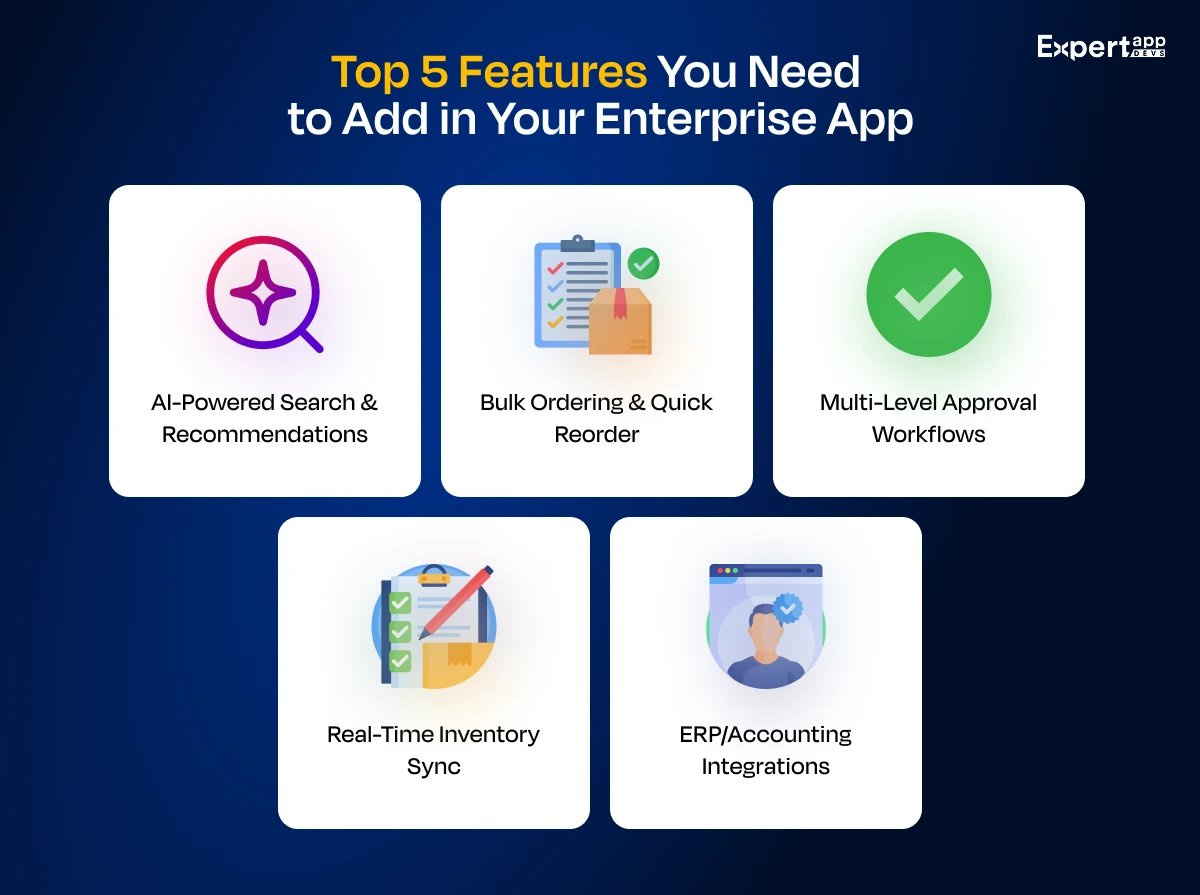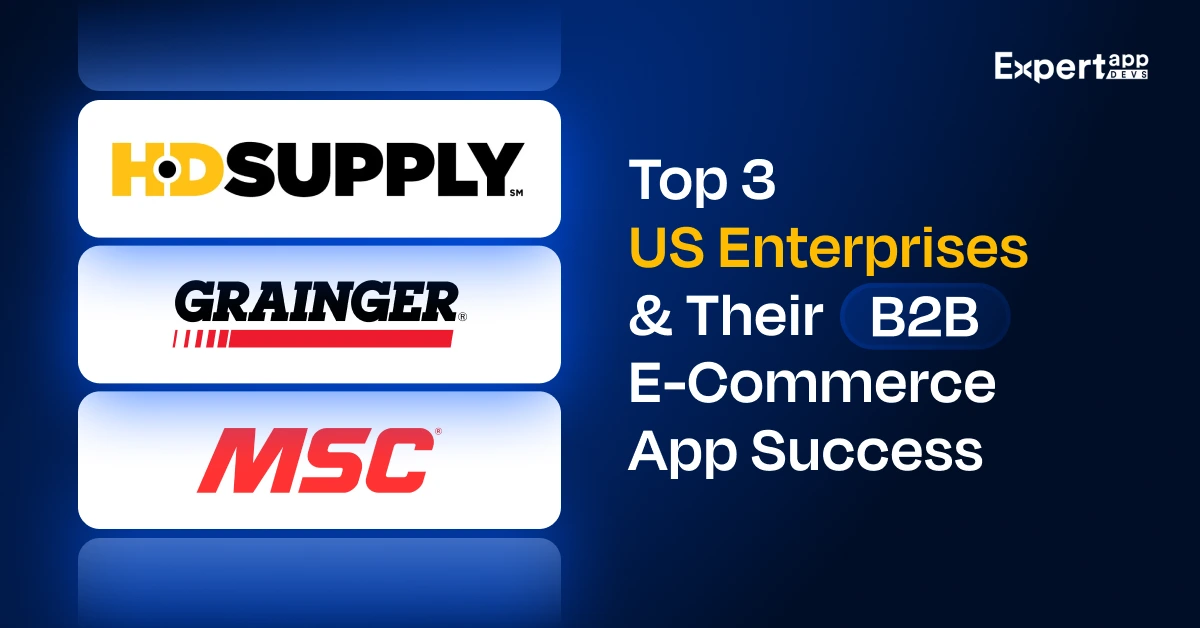B2B eCommerce App Success: How Grainger, MSC and HD Supply Drive Digital Procurement?
Did you know the future of enterprise commerce doesn’t lie in what you sell; it is about how you buy. For most of you, B2B commerce goes beyond a digital storefront; it is all a fierce battleground for operational dominance.
With the increasing complexity of the enterprise procurement processes, it is time for you to embrace custom B2B ecommerce applications that can simplify purchases and automate workflows. You can get real-time insights into your purchase workflow that help you make faster and smarter decisions.
The landscape is full of custom procurement applications that take a mobile-first approach to help deliver your goals. So, what differentiates the top players from others? Their ability to blend strategic foresight with seamless user experiences is one of the reasons they lead the landscape.
Additionally, they foster innovation using personalized interfaces and custom features while enabling integration with legacy systems. At the core of this dynamic is Expert App Devs, a company that focuses on delivering custom app solutions to build scalable and secure platforms that evolve with enterprise needs.
In this article, we will discuss the power of procurement applications and the top B2B eCommerce success stories in detail.
The Rise of B2B E-Commerce in Key US Markets
If you have kept tabs on the market, you would have noticed that B2B commerce is evolving with high velocity, wherein major markets like New York, Los Angeles and Chicago are becoming the hotbeds of innovation. They are economic powerhouses and among the early adopters of advanced tools and technologies that help deliver operational efficiency.
More businesses seeking supply chain efficiency and real-time procurement solutions to drive their users’ experiences are relying on mobile-first eCommerce platforms. Let’s look at the market trends and need for mobile-first applications.
Mobile Trends and Their Adoption
Let’s look at the region-specific mobile trends you must adopt for an extensive experience.
New York houses several enterprises, which is why it is leading the fintech-integrated B2B space. There are several companies here that prioritize real-time analytics and automation. That’s why you would notice a phenomenal investment in AI-backed procurement apps, especially in this region.
Another city reinventing the B2B commerce landscape is Los Angeles. It is a hub for logistics and manufacturing, which is why you will notice a demand for mobile eCommerce applications to improve vendor coordination and streamline inventory. The drivers of B2B eCommerce in this city are sustainability and agility.
Chicago is the third city where you would notice a strong growth of procurement applications. These apps drive accuracy while minimizing downtime.
Why You Need Mobile Apps for B2B Procurement?
Mobile apps offer a critical advantage to your business in enhancing operations and scaling the business. Here are a few reasons to take the mobile-first approach.
- It helps you make decisions while on the go. You can access the pricing, inventory and approvals, even when you are out of the office. This enables quick procurement processes.
- You can automate the entire process from purchase order generation to approvals from the application by integrating ERP. This would accelerate the procurement journey
- You can get real-time updates on inventory, shipping, and supplier communication, thus reducing bottlenecks
- Customize the mobile applications for different roles, product categories, and purchasing behaviour.
Top companies like Grainger, based in Chicago, MSC Industrial Supply from New York and HD Supply in LA and Chicago have set the benchmarks for B2B eCommerce success. These companies have showcased how a mobile-first solution can help your enterprise in an evolving ecosystem.
We will look at these companies in detail in the upcoming sections.
The Power of B2B E-Commerce Apps in Modern Procurement
B2B eCommerce applications can transform how your enterprises can purchase, connect and operation. The mobile applications are central to modern procurement requirements.
Key Stats of B2B eCommerce Applications
With mobility and convenience driving the B2B buying experience, it has undergone a massive shift. According to a report by BigCommerce, 72% of the B2B buyers prefer using mobile phones to complete purchases.
This trend showcases the growing demand for accessibility, intuitive user interfaces and access to product information plus support. If you are a modern enterprise, you must have mobile-optimized solutions to ensure you convert every opportunity and delight your users.
If you have a dedicated B2B eCommerce application, you will notice a tangible increase in performance. Several businesses with tailored mobile-first procurement solutions improve the average order value by 10-20%.
You can focus on your most loyal customers to further personalize the solution and improve the benchmarks. Such mobile apps have also improved employee engagement by 20-30%. Embracing AI for your procurement application will prove to be an advantage. It can reduce the costs by 15% and enhance sales-backed conversion.
Using the AI-driven procurement tools, you can also optimize purchasing patterns, minimize errors and forecast the demand for upcoming months.
With customer-centric innovations at the core of your mobile application, you will notice that the value proposition of your B2B eCommerce apps will grow stronger.
Why Mobile Apps Outperform Web-Only Platforms?
Would you navigate the clunky web dashboards or reorder from your phone using a few taps? As an enterprise, mobile apps are quickly becoming your go-to tool for managing procurements and inventory. They are convenient, fast and offer better control. Moreover, owing to their efficiency, which is missing in web-based tools, you tend to embrace mobile applications.
- Mobile apps extend the ability to reorder with greater agility and speed. You can use a personalized reordering list that is in sync with your past purchases. It enables barcode scanning, making bulk ordering easy and efficient. Lastly, the push notifications keep you aware of when it is time to restock.
- Mobile apps are very different from static web catalogs, as it offer live data. You will get up-to-the-minute stock levels so that you can avoid delays caused by out-of-stock. Dynamic pricing reflects negotiation, promotions and volume discounts. You will get complete information on the inventory available in your region or warehouse.
- Mobile apps can streamline the entire workflow, thus making it easier for you to place the orders. It will integrate with your ERP systems to ensure you have a complete understanding PO generation, invoice syncing and budget tracking. You can speed up approvals by offering it on mobile apps.
Mobile apps are a smart choice for your business, ensuring smarter purchasing and faster operations.
READ MORE: Why React Native Is the Best Framework for Enterprise App Development?
Top B2B E-Commerce Leaders and Their App Success Stories
There are several US enterprises that are redefining what is possible with B2B eCommerce, ranging from industrial supplies to large-scale procurement. Here are the top players of this industry that are setting the standard for app strategy and procurement.

#1. Grainger
Grainger is one of the leading industrial supply companies that specializes in MRO (Maintenance, Repair, Operations) of inventory. They have an eCommerce platform with physical distribution stores.
As a B2B platform, they have an old-school look while keeping their solution user-friendly and organized. Dealing in small industrial parts, aftermarket materials and tools, they provide all the specialized parts that most often come from an OEM.
With an Amazon-like marketplace platform for B2B businesses, they let buyers and sellers meet and complete the transaction. With a few clicks, the customer can purchase the materials and get it shipped to their address within 2 business days.
Need for B2B Procurement Channel
Grainger has close to 1.2 million products in their inventory, which is growing continuously as it collaborates with various vendors. Their biggest challenge was keeping up with the inventory and ensuring proper transactions without letting go of a single opportunity.
Along with their physical distribution stores, they wanted to target their online customers by reaching them on their desktops and phones. Additionally, they wanted to reduce the challenges faced by the CFO, such as cost reduction, flexibility, profits and transparency.
With a single application, they were able to manage the stockouts, ensure they reach a wide audience and convert every opportunity.
The Solution
The mobile application became a channel for selling their products to the B2B customers. Apart from this, the app owners also provided value-added services. Grainger extends inventory management and technical support services. The customer-managed inventory system allows its users to automate the inventory management solutions, including tracking and re-stocking.
Key Business Strategies
Grainger has become a powerhouse for the industrial supply sector, owing to its aggressive and smart digital strategy. They have a data-driven and mobile-first procurement strategy that enables customer retention.
1. 70% Sales Through Digital Channels
They use their mobile application with an eCommerce portal to drive more than 70% of the total sales for the business. As the business is committed to meeting the buyers on the channels they are present on, they have built a user-friendly and fast interface that prioritizes transparency and efficiency. As it simplifies the buyer’s journey, it delivers maximum value to the business.
2. AI-backed Search and ERP Integration
The company has invested in an AI-driven strategy, wherein the search tools can easily extract the results from over 1.5 million items. The search system has been built from past user behavior and deep integration with ERP-like systems to deliver relevant data. It can help automate the procurement workflows to reduce expensive errors.
3. Enterprise-grade Procurement Tools
Grainger has built a top-notch procurement infrastructure for the enterprise clients. This system allows users to manage the apps using role-based permissions. You can also sync PO with the accounting systems to automate the workflows. It also sets the spending limits for best financial management.
App Success Highlights
The Grainger mobile app enhances the performance for the procurement teams. Here are the app success highlights.
- Using AI-powered search, the discovery time has reduced by 40%. The intelligent search engine can understand the customer’s context, product specs and buyer behaviour to help users find the right parts with fewer clicks.
- With mobile-first bulk discounts it helps drive repeat orders. The high-volume and repeat buyers have made the app a preferred channel for procurement.
- The ERP integrations have helped automate the procurement for Fortune 500 clients. It helped automate reordering, streamline the approvals and sync purchasing within financial systems.
#2. MSC Industrial Supply
MSC Industrial Supply is a leading distributor of metalworking and maintenance repair and operations related products. They have more than a million customers across North America. MSC recognized the need to move towards the digital medium with the increasing complexities and decentralization of procurement processes. This shift helped them gain the speed, agility, convenience and control they needed.
Need for Mobile B2B Procurement Channel
The web platform for the company was robust. However, it didn’t meet the new-age user’s requirements, who wanted to ensure procurement occurred on-the-go. They were specifically useful to companies in the industrial and manufacturing sectors. The procurement professionals across North America needed quick access to the product inventory in real-time.
The mobile tool gave them the ability to view out-of-stock products in advance so that they don’t lose any opportunities. It also provides the B2B procurement teams handle the requisition lists with approval workflows. At the same time, it has simplified repeat ordering for those agents who are on the site.
With such accessibility requirements, it has become important for businesses to take the mobile-first approach.
The Solution
The company has released an eCommerce mobile application that integrates with the backend system while delivering a user-centric design. They included advanced search and filtering tools to customize the complex product catalogs.
They have also included barcode scanning that helps reorder products from the inventory shelves. The customer requisition list feature allows repeat ordering from the history while mobile dashboards can streamline approvals.
The users could also enable account-specific pricing and access custom catalogs to meet enterprise customer needs.
Key Business Strategies
The business has embraced a digital vision to streamline the complex B2B purchasing and support processes to ensure buyers thrive throughout the digital procurement journey.
1. Digital-First Procurement Workflows
The mobile application reinvented the buyer’s experience using speed and automation at the core of the solution. From requisition creation to routing approvals, each step within the procurement process is managed digitally. This reduces paperwork and manual errors, offering maximum transparency and control.
2. Real-time Inventory Management
Inventory visibility is one of the core strategies of a mobile application. Buyers can take note of the stock levels, estimated delivery time and warehouse proximity from the mobile application. Using the real-time data, purchasing teams can make confident decisions.
3. Dedicated Mobile App for Enterprise Clients
The mobile app is built with enterprise-grade functionality that is tailored for business users. From barcode scanning to custom catalogs, the features offer greater accessibility.
App Success Highlights
Here are the highlights of the app that has helped the business deliver measurable impact for its enterprise clients.
- The users can directly scan the barcode from inventory shelves to check for availability or reorder the products, thus saving a lot of their time.
- The app offers layered permissions, which enable procurement managers to track approvals and manage budget controls.
- The push notification can boost flash deal conversions by 25%. Using these alerts, you can provide the users' order status updates, low-stock warnings and limited-time offers.
#3. HD Supply
HD Supply is a Los Angeles-based company and one of the largest distributors in North America. It provides facilities maintenance, construction and industrial customers. You will find an in-depth catalog that matches the complex order requirements.
The company has recognized a growing need for mobile-first solutions, especially for enterprise buyers who need complete visibility into their inventory.
Need for Mobile Application
With an evolving customer base, they needed to go beyond the website. Property managers, contractors and maintenance teams within an organization require instant access to parts, pricing and purchase history. They needed accessibility while on the go without compromising on the speed and accuracy of the orders. That’s why a mobile-first application was needed.
The Solution
The company worked on a mobile application that provided several features. These features provide bulk ordering using quick reorder tools to ensure faster replenishment. It also provides real-time inventory and pricing updates to the local distribution centres. They also ensured personalized product catalogs that were delivered using purchase history and account pricing data. Lastly, the apps came with push notifications that provided exclusive mobile deals.
Key Business Strategies
With a mobile application that served convenience, they were able to reduce costs and offer time-saving solutions.
- The app makes bulk purchases and frequent reorders fast and seamless. You can complete the transactions with a single click, thus saving your procurement team’s time and mitigating the risks, especially with recurring supply needs.
- The app can seamlessly integrate with property management, hotels and multi-unit housing systems for better order fulfillment and automated invoicing.
- This app prioritizes mobile functionality, such as product discovery and checkout. It is designed to support barcode scanning and delivery tracking.
App Success Highlights
- It provides one-click reorder that can save up to 50 hours/month, freeing up your facility management to focus on core operations.
- B2B users can stock up the products in the nearest distribution centres while enabling smarter sourcing and faster pickups.
- With digital invoicing, customers can integrate the app with customer accounting systems to cut down manual entry.
How to Build a High-Impact B2B E-Commerce App?
When you are planning to build a B2B eCommerce application that drives value, it is not just about the technology but also about solving real-time business problems. There are several aspects to consider, including strategic planning and smart integrations to build a results-driven and easy-to-adopt application.

#1. Define Your Buyer’s Persona
You must understand the buyers and what makes them purchase a product. Map the procurement journey, identify the challenges throughout procurement and the approval chains. With this insight into the buyer’s journey, you can determine the features you must add. This would include all aspects from navigation to checkout.
#2. Prioritize Mobile-First Design
Users expect high speed, clarity and convenience while using the mobile application. You must take the mobile-first design approach to create clean interfaces, intuitive layouts and minimal steps to ensure fast orders.
#3. Integrate Core Features
You must incorporate features like AI-backed search, quick reorders and real-time inventory management to ensure smooth workflows. Industry leaders like Grainger, HD Supply and MSC have set the benchmarks for these applications.
#4. Connect with Systems
You should provide an app that becomes a part of the buyer’s workflow. For this purpose, you need to integrate with back-office systems like SAP and QuickBooks. You must remove friction and provide the procurement team with full visibility into the inventory.
#5. Focus on Security and Compliance
You must prioritize security and compliance within the mobile application. Use robust encryption, user permissions and compliance standards like GDPR and SOC2 to build a future-proof and trustworthy platform.
#6. Test, Iterate and Scale
Launch your app in the beta group to collect real-world feedback. This will help you refine the application. You can continuously iterate using buyer behaviour and their evolving needs to ensure long-term success and retention.
Must-Have Features for Enterprise Apps
It’s crucial to go beyond a sleek interface to build a successful B2B eCommerce mobile application. If you want to support the eCommerce enterprise buyers, you must solve their pain points using speed, intelligence and seamless integration.

#1. AI-Powered Search & Recommendations
Your buyers don’t have the time to scroll through the thousands of SKUs you have on your mobile app. That’s why you need an AI-powered smart search that can help you find what you want. Based on the specifications, order history and past purchases, they can help you discover the items without investing a lot of money.
#2. Bulk Ordering & Quick Reorder
Industrial buyers can purchase products in large volumes. It can enable them to build bulk orders or manage reordering based on past purchases with a single tap. It can speed up the procurement cycles and ensure smooth inventory management.
#3. Multi-Level Approval Workflows
When you need to control large teams, you must include a multi-level approval workflow. It can help you support multiple user roles with tiered permissions. It can ensure that the approval-based orders are routed to the right department so that your purchases are not blocked.
#4. Real-Time Inventory Sync
Imagine what your customer might feel when they place an order only to find out it is no longer available. With real-time visibility into your inventory, you can avoid the fulfillment delays while improving decision-making.
#5. ERP/Accounting Integrations (SAP, NetSuite, QuickBooks)
The backend systems are important for enterprise buyers. The app can integrate with the ERP and accounting software, thus ensuring syncing of invoices, orders and budgets. This can enhance your workflow.
How Expert App Development Drives B2B E-Commerce Success?
Behind a successful B2B eCommerce platform is expert app development that goes beyond clean code. It is all about building a scalable, secure and future-proof application that meets the real-world needs of your enterprise.
#1. Why Custom B2B Apps Matter
Off-the-shelf platforms may not be able to deliver upon the complex requirements of enterprise procurement. You need custom B2B applications to gain complete business control, provide flexibility and meet specific operational goals.
#2. Personalized Procurement Experiences
Your enterprise might have unique workflows and approval processes, which your off-the-shelf app may not be able to deliver. You can personalize dashboards, offer contractual pricing and define user-specific access for stronger client relationships and improved buying experience.
#3. Scalable and Secure Payment Integrations
Whether you are considering purchase orders, digital wallets or net terms, you will find that B2B payments are complex. You can seamlessly integrate payment gateways and ERP-linked billing systems with your custom applications while maintaining encryption and compliance standards.
#4. AI and IoT-powered operational efficiency
Including advanced features like AI-driven demand forecasting and smart reorder recommendations, you can transform supply chain management. Using custom apps, you can enable tech integrations for better automations and real-time insights.
How ExpertAppDevs.com Helps Enterprises?
We specialize in delivering high-performing B2B eCommerce applications that go beyond selling products. We provide apps that streamline and scale your enterprise operations.
- We build mobile applications that are unique to your procurement needs. From providing multi-user approval chains to offering contract-based pricing, we ensure all your features you need. We ensure each feature reflects your team's requirements.
- Our team ensures the apps connect seamlessly with systems like SAP, NetSuite and QuickBooks. This ensures real-time sync of orders and financials, making sure there is no duplicate data entry.
- In-built data analytics and AI-backed recommendations are some of the advanced features to build smarter and faster applications. You can ensure better forecasting and improve repeat orders with these features.
- We provide applications with GDPR and SOC2 compliance to maintain hthe ighest security standards. It helps us keep your data protected and compliant while maintaining simplified operations.
READ MORE: eCommerce Mobile App Development Cost [Detailed Cost Breakdown]
Key Takeaways & Next Steps
In a competitive B2B landscape, mobile apps aren’t just nice, but also essential to gain a competitive edge. Here are some of the gains enterprises get by going digital first.
- B2B apps can deliver real edge to businesses by streamlining procurement and enhancing customer loyalty.
- It can help speed up your buying cycles, ensuring higher average order values.
- AI and real-time inventory can ensure top players can outpace their competition.
- With a mobile app, you can reduce waiting and enhance the speed of procurement.
To keep up with the growing demand for B2B mobile applications for procurement, you need a good tech partner. Expert App Devs is experienced in delivering simplified applications to enhance digital procurement journeys. Connect with us to build your next-gen custom enterprise application.
Common Frequently Asked Questions for B2B eCommerce App
Q1: What is a B2B e-commerce app?
A B2B eCommerce mobile application is a platform designed to allow businesses to purchase products or services from other businesses via the digital medium. It streamlines digital procurement processes and simplifies aspects like ordering and approvals.
Q2: What are some key features of a good B2B e-commerce app?
The application must have essential features like bulk ordering, AI-backed search, real-time inventory, ERP integration and bulk ordering to ensure scalable and secure solutions.
Q3: How much does it cost to build a B2B e-commerce app?
The cost of developing a B2B eCommerce application depends on features, integrations and scale. On average, you can expect about $50000 to $300,000 to build a next-gen enterprise application.
Q4: Who uses B2B e-commerce apps?
The B2B eCommerce apps can be useful to the facility managers, contractors and enterprise buyers across major industries like manufacturing and healthcare.
Q5: How long does it take to build a B2B app?
It can take anywhere between 3 to 4 months to develop an MVP. You can build a fully-featured enterprise-grade application in approximately 6-9 months. During these months, you must plan, develop, test and deploy the applications.
Q6: How do these apps improve business relationships?
The enterprise B2B eCommerce applications ensure transparency, faster communication and personalized workflows to enhance trust, loyalty and long-term partnerships.
Key items include data encryption, role-based access control, secure payment gateways, GDPR/SOC 2 compliance, regular security audits, and secure API integrations.
Q7: What is a security checklist for a B2B e-commerce app?
Key items to include in your security checklist would be data encryption like SSL, role-based access control, secure payment gateways and GDPR/SOC2 compliance.
 Jignen Pandya
Jignen Pandya




